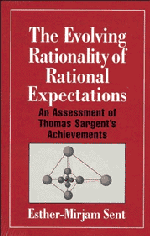6 - An Interview with Thomas Sargent
Published online by Cambridge University Press: 18 December 2009
Summary
There is … a case in which it can be interesting to resort to the intention of the empirical author. There are cases in which the author is still living, the critics have given their interpretations of his text, and it can then be interesting to ask the author how much and to what extent he, as an empirical person, was aware of the manifold interpretations his text supported. At this point the response of the author must not be used to validate the interpretations of his text, but to show the discrepancies between the author's intention and the intention of the text. The aim of the experiment is not a critical one, but, rather, a theoretical one.
Umberto Eco, Interpretation and Overinterpretation, pp. 72–3Monday, April 25, 1994
[Esther-Mirjam Sent] I suppose you now know what the topic of my manuscript is. I started this research because I was very confused by your classes, because I wasn't quite sure what rational expectations modeling is all about and why I should be using it. When I started reading about the history of rational expectations, I found out that there were very many stories that could be told about the interpretation and development of rational expectations, and that historians of economic thought very often tried to paint a very simple picture. I then tried to get a deeper understanding by going down to the individual level of your research on rational expectations, and I realized that your interpretation of rational expectations kept changing.
- Type
- Chapter
- Information
- The Evolving Rationality of Rational ExpectationsAn Assessment of Thomas Sargent's Achievements, pp. 163 - 178Publisher: Cambridge University PressPrint publication year: 1998

